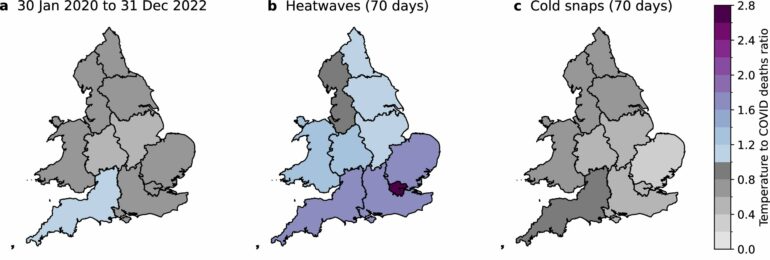Research has highlighted how weather extremes worsened by climate change are now a major national public health threat.
The study, led by the University of Bristol and published today in Nature Communications, showed how the death toll from temperature hazards overtook the number of deaths from COVID-19 in the South West region of England, when the UK was in the throes of the pandemic.
Lead author Dr. Eunice Lo, Research Fellow in Climate Change and Health at the University’s Cabot Institute for the Environment and Elizabeth Blackwell Institute for Health Research, said, “The statistics are stark and illustrate how high the health burden of adverse weather is in the UK in the current climate. I anticipated higher levels of mortality than normal as the country was also experiencing a record heat wave during the peak of the pandemic, but the extent of the increases is surprising and concerning.”
The researchers sprang into action after Sir Patrick Vallance, the UK Government’s former Chief Scientific Adviser, highlighted at COP26 that the climate crisis was a far bigger problem than COVID-19, which would prove more fatal without immediate changes.
Their findings clearly evidence such claims with analysis revealing temperature-related mortality exceeded COVID-19 mortality by 8% in South West England between 2020 and 2022. Temperature-related deaths were also just a quarter less than deaths from COVID-19 in London and not far from a third less (58%) in East Midlands over the same period.
Dr. Lo said, “The pandemic rightfully generated huge media attention with the spotlight on daily briefings announcing the latest death toll and public health interventions. Although many, and in some parts of the country more, people were dying from high and low temperatures, this largely went under the radar. Ironically, the record temperatures, topping 40 degrees, were associated with positive news of people enjoying the sunshine, which perhaps reflects a general lack of awareness about how harmful excess heat can be.”
The research highlighted how the coinciding crises presented by COVID-19 coupled with a heat wave or conversely an extreme cold snap put health services under unprecedented pressure, potentially increasing avoidable loss of life.
Findings showed combined excess deaths from extreme temperatures and COVID-19 between 2020 and 2022 were at least twice as high than the previous decade, depending on the region.
Dr. Lo said, “The figures strongly demonstrate how negative consequences compound when there are co-occurring major health and weather-related events. For instance, extreme cold during the outbreak of an unexpected disease puts massive strain on hospital bed availability. This research therefore underscores how the UK must be more robustly prepared for such eventualities, which are likely to coincide more often in future with the growing specter of a changing climate and other global health threats.”
Sir Patrick Vallance discussed whether it was possible to compare the relative health impacts of COVID-19 and climate change with Prof. Phil Taylor, Pro Vice-Chancellor for Research and Enterprise, and Dann Mitchell, Professor of Climate Science at the University of Bristol at COP26, hosted by Glasgow in 2021.
Prof. Mitchell and Dr. Lo set to analyzing relevant statistics to better understand the comparative health repercussions. They wrote to Sir Patrick sharing the findings and were invited to present them at the Natural History Museum.
Co-author Prof. Dann Mitchell said, “Climate change is not just an environmental issue; it is a constant, underlying stressor that magnifies the impacts of other global crises, including pandemics, wars, and economic instability. Our research highlights that during the peak of the COVID-19 pandemic, the compound effects of extreme temperatures led to significant mortality burdens in the UK.
“This was likely much larger in other, less developed countries. Our evidence illustrates how climate change can intersect with and exacerbates other crises, creating a multiplier effect that can strain health systems, destabilize economies, and heighten social tensions. To mitigate these compounded risks, it is imperative to integrate climate resilience into global health, economic, and security policies.”
More information:
Y. T. Eunice Lo et al, Compound mortality impacts from extreme temperatures and the COVID-19 pandemic, Nature Communications (2024). DOI: 10.1038/s41467-024-48207-2
Provided by
University of Bristol
Citation:
Research reveals that more people died from hot or cold weather conditions than COVID-19 in parts of UK (2024, May 23)



